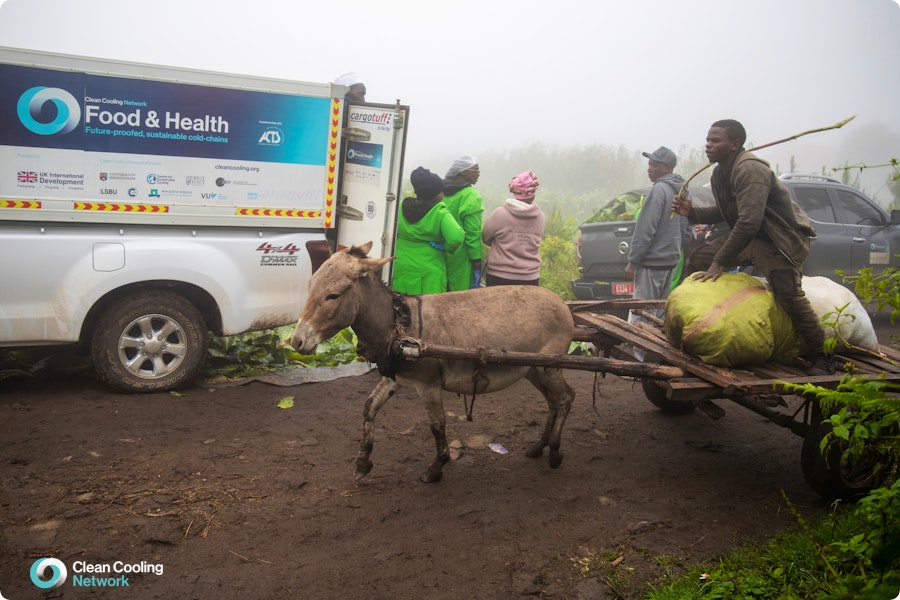
The Africa Centre of Excellence for Sustainable Cooling and Cold-chain (ACES) was conceived to increase and accelerate the adoption and uptake of resilient, efficient, inclusive and climate-friendly cooling and cold-chain with the triple objective of:
- Reducing food and vaccine loss;
- Economically empowering subsistence and smallholder farmers and their communities;
- Mitigating the potential environmental impact of the cold-chain.
To extend its impact, ACES was designed with a “and SPOKE” model in strategic locations across the continent to flow the knowledge, training and support out to other markets. Specifically, these SPOKEs, developed with in-country expert partners, house the local/near to market training and community support to put into practice and demonstrate real world solutions. The SPOKE teams develop model communities which can become the training, evidence base and demonstration centres, cascading the knowledge to other communities further in their regions. The first SPOKE is in Kenya, led by the African Centre for Technology Studies (ACTS), and they are working with a new Farmer Co-operative (Lari Horticulture Co-operative Ltd.) as the pilot community.
Cold-chains are critical infrastructure, vital for a well-functioning society and economy; they underpin access to safe and nutritious food and health, as well as our ability to spur economic growth, and deliver socioeconomic development. Equally, the lack of cold-chain has major social, economic and environmental consequences.
Integrating smallholder farmer communities into modern value chains is a pivotal strategy in rural development. The challenge is that cold-chains are complex - multi-dimensional, temperature-controlled networks that must maintain perishable and temperature-sensitive products at their optimum temperature and environment from point of harvest to destination. They include both static and mobile elements that must work seamlessly together, and which are a primary source of different energy demands. And they include multiple stakeholders but are mainly driven by the private sector.
Equally, smallholder farmers face numerous obstacles: they are dispersed and fragmented, suffer from high transaction costs and have limited access to end-to-end infrastructure from farm to fork. They typically struggle to capitalise on economic prospects within the market or influence policies that affect them. Asymmetric asset distribution and, power imbalances with other stakeholders hinder smallholder farmers' access to essential resources necessary to enhance productivity, market their products, and engage in decision-making processes.
The SPOKE team provide the essential enabling mechanisms, tools, technology selection, business model, governance and operational systems, and targeted training (including PHM and EHS) necessary to support community leaders and the wider community to establish a grassroots, community cold-chain ecosystem and integrate cold-chain into their operations.
As a second phase, through the Try Before You Buy (TBYB) concept, a package of basic cold-chain equipment (static and transport) is temporarily (e.g. for a season) installed within a community, during which time they can test out their business model in real conditions with ongoing support and mentoring during this period.
The primary wins of the TBYB approach include:
- Farmer communities and households gain first-hand experience of the tangible benefits of cold-chain and value-added activities.
- Communities have the opportunity to develop, test, evaluate and refine their business models and operational details as well as testing and validating their cold-chain needs and opportunities.
- By demonstrating proof-of-concept and practical viability, TBYB builds confidence among investors and financial institutions to provide financing, as well as among farmers and cooperatives to invest in their own fit-for-purpose cold-chain infrastructure - own CCH.
Ultimately, TBYB bridges the gap between initial interest and long-term adoption by providing communities with concrete evidence of feasibility and economic viability.
Clearly, the programme does not allow for every farming community to have access to the TBYB. The programme therefore selects communities who are to be given TBYB equipment to act as ‘’communities” and become learning hubs, providing the first-hand evidence and knowledge to other surrounding communities underpinned by the SPOKE team as a regional facilitator. In this way, each TBYB can both support the model communities but also underpin active engagement by the SPOKE team with other regional farming communities.
Our objective is to combine training, support and demonstration to deploy resilient cold-chain which increases the value returned to the community. In so doing we can make smallholder farming communities more inclusive, equitable and resilient partners in the value chain, fostering relationships, and working together towards the common objective of a well-functioning society and economy.